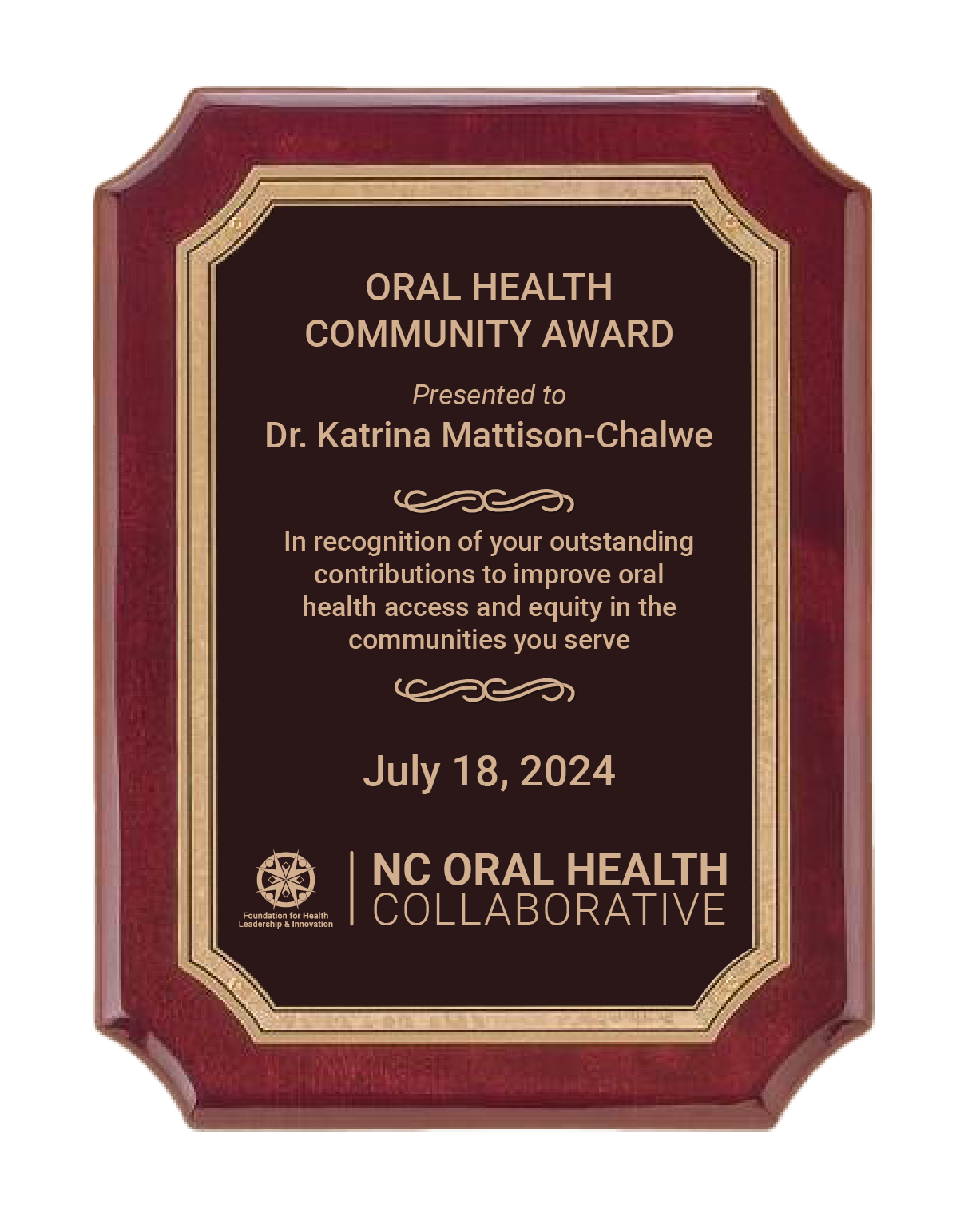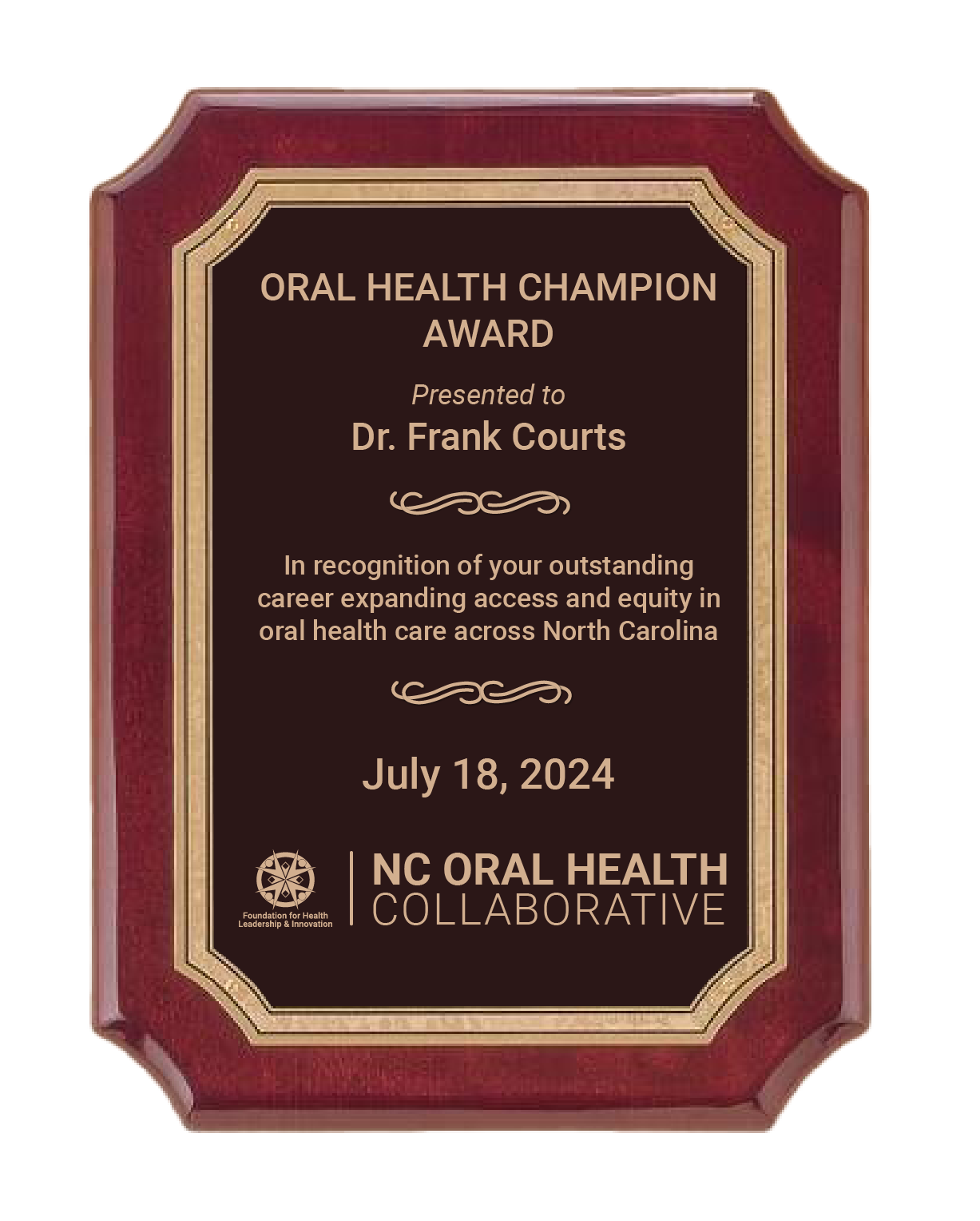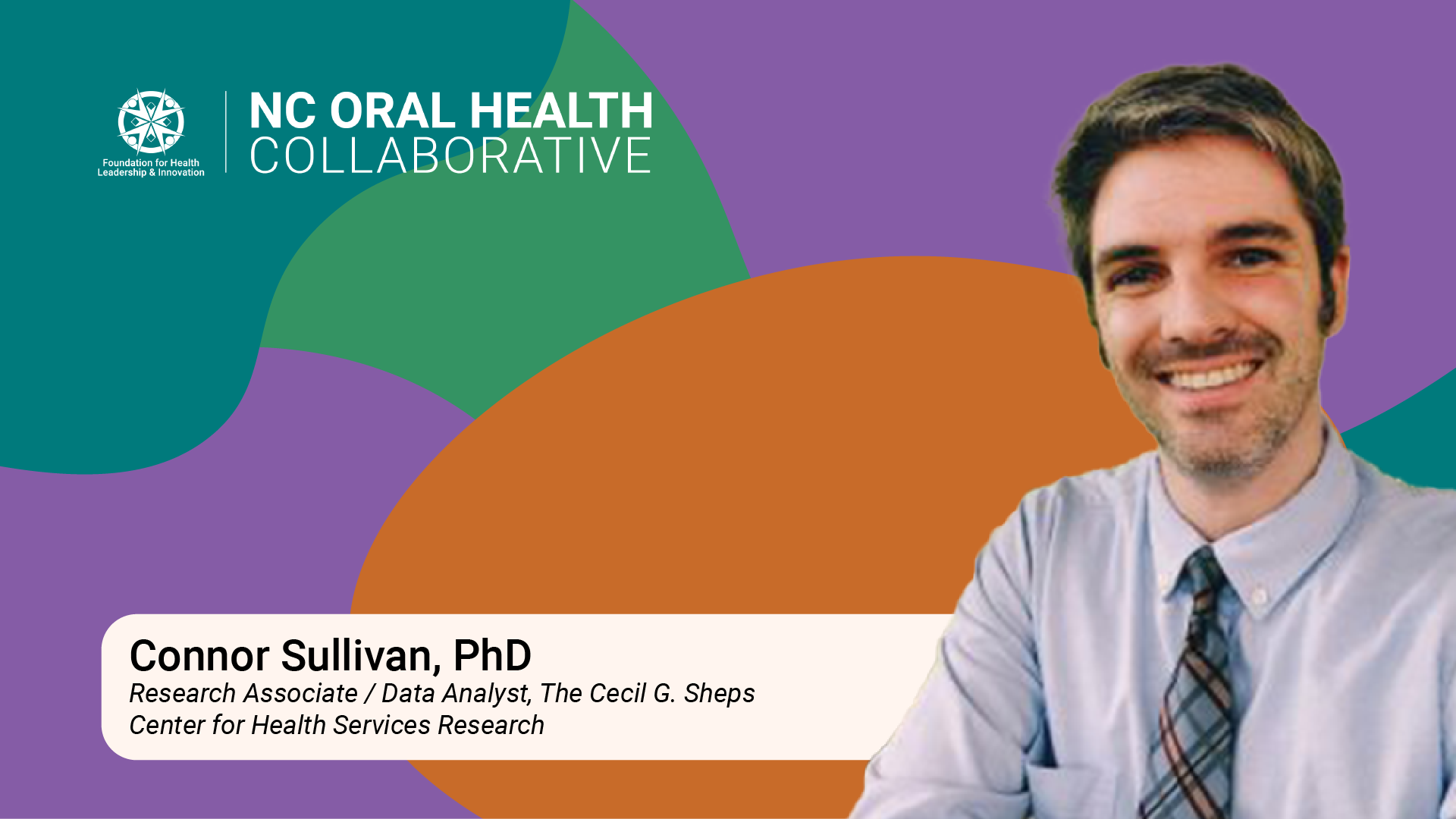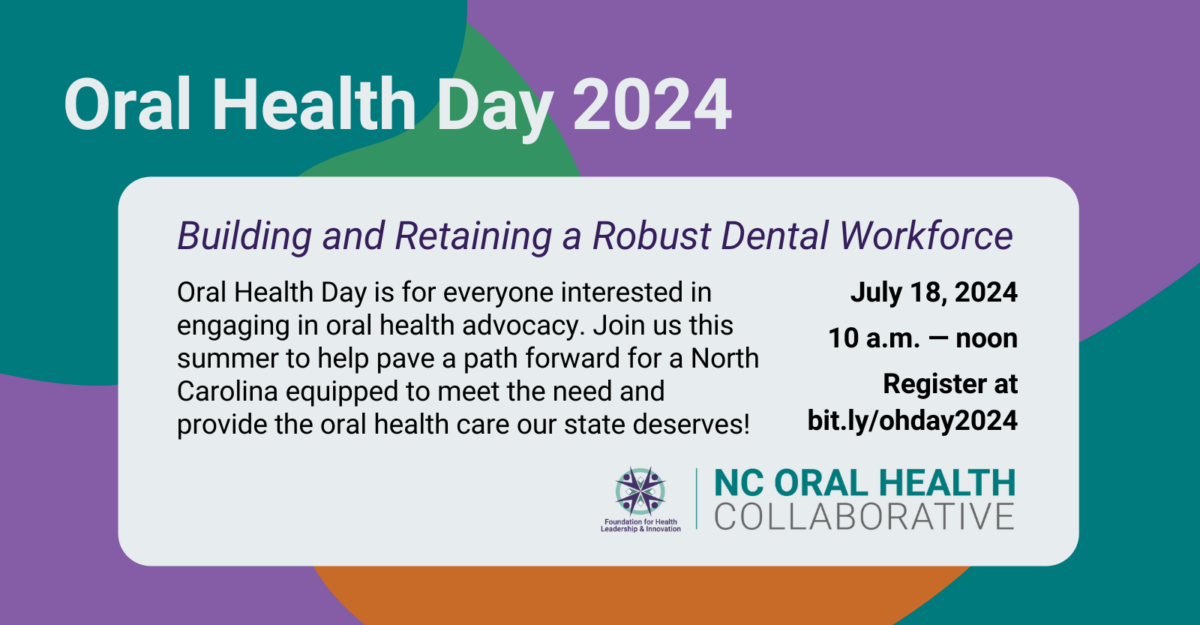Thank you to all who joined us for Oral Health Day 2024! We’re excited to share that we had our highest participation yet. This year, NCOHC presented two new awards and we heard from expert speakers, including a “North Carolina’s Oral Health Workforce, by the Numbers” presentation and panel discussion.
If you couldn’t make it, you can watch the full recording. Below, you will also find details about our awardees, NC oral health workforce data, panel discussion highlights, and resources from our speakers.
Oral Health Advocate Awardees
NCOHC staff presented two awards during this year’s event. Dr. Katrina Mattison-Chalwe received the Oral Health Community Award, and Dr. Frank Courts received the Oral Health Champion Award.
Dr. Katrina Mattison-Chalwe: Oral Health Community Awardee
In addition to her full-time job leading a public health dental team and a mobile dental unit, Dr. Mattison-Chalwe also finds time to lead a nonprofit called Smiles for Jesus. She was instrumental in co-chairing the recent North Carolina Institute of Medicine Oral Health Transformation Task Force and has proven herself to be an important voice in the work to improve access and equity in care in North Carolina.

Dr. Frank Courts: Oral Health Champion Award
Dr. Courts was the first dentist in North Carolina to pilot a school-based oral health program. He is a frequent participant in task forces aimed at improving care, and he is an accomplished mentor of oral health professionals, encouraging the workforce to center patients in the care they provide.

“North Carolina’s Oral Health Workforce, by the Numbers”

Connor Sullivan, PhD, presented data from the Cecil G. Sheps Center for Health Services Research at UNC, which informs state, regional, and national workforce policy. Independent of government and health care professionals, the NC Health Professions Data System (HPDS) has 43 years of continuous, complete licensure (not survey) data on 21 health professions from 11 boards. The system is a collaboration between the Sheps Center, NC Area Health Education Centers (NC AHEC), and the health professions licensing boards.
During his presentation, Dr. Sullivan broke down the statewide movement of dentists, the concentration of dentists by county, the concentration of dentists by county per dental school, the top five dental schools in the NC workforce, race/ethnicity of dentists and registered dental hygienists (RDH) versus population diversity, and the number of active RDHs over time (2000 to present). A few highlights include:
- 5.5% net gain in number of NC dentists after imports and exports
- 60% of newly graduated dentists went to just 5 out of 100 counties in NC
- Eastern Carolina University (ECU) graduates are nearly two times more likely than all other NC programs to serve rural areas
One of the big takeaways from his talk was that the number of dentists in North Carolina is improving, but distribution and diversity remain challenges.
Oral Health Workforce Panel Discussion

This year, Hugh Tilson, JD, MPH, moderated the Oral Health Workforce panel discussion and asked about NC’s dental workforce challenges and opportunities.
Dr. Courts highlighted the importance of community-based recruitment and introducing young people to oral health opportunities when considering their career options. He reported that the NC Dental Society (NCDS) awarded 16 dental assisting scholarships and 20 stipends for dental assistants to take the certification exam. He also shared that:
- A new high school program focused on introducing students to the dental field is coming soon.
- There are two new dental assisting programs at Alamance and Southwestern community colleges.
- There are two new dental hygiene programs at Isothermal and Southwestern community colleges.
Andy MacCracken, MPA, discussed the need for critical health workforce coordination, longer-term workforce development, and community-based, non-licensed, non-certified oral health team members.
Stephanie McGarrah, MPP, shared about the $110B that NC received from across six bills in 2020, which is still being directed toward dental practices, businesses, and health systems. She also highlighted the growing trends in high schools to encourage students to explore career opportunities that do not require a four-year college degree.
Melissa Smith, MSEd, RT-R, CT (ARRT), CNMT, spoke about NC’s 13 hygiene programs and 19 CODA-accredited DAII programs. She also shared that the General Assembly provided funds to start and expand health care programs statewide. So far, $4M has gone to expanding dental assisting programs at two schools, starting dental assisting programs at five schools, and starting dental hygiene programs at two schools, including one evening program.
What Keeps You up at Night?
For Smith, the need for qualified faculty, the funding to pay them adequately, and clinical space are top priorities.
McGarrah said recruitment for oral health professionals remains a crucial piece of addressing the ongoing workforce challenges.
MacCracken emphasized the need for supporting and increasing the number of non-licensed, non-certified oral health team members who are also part of the communities they serve.
Dr. Courts thinks it is vital to build and maintain strong community relationships, focus on recruitment in the community, and prioritize introducing young adults to the oral health field.
How Can Oral Health Professionals Engage in NC Workforce Initiatives?
McGarrah shared a new tool from the Department of Commerce called Reality Check. It enables folks to build a budget for things they want and then matches them with jobs that can provide a salary that supports their budget and details about the education required. She emphasized that there is a shifting focus in high schools for students to consider future careers that do not require four-year college degrees.
Smith said it is important to start the workforce pathway as young as elementary school by introducing students to opportunities within oral health.
Tilson shared that the NC Dental Society (NCDS) does outreach at high schools and needs volunteers to speak with students. He also mentioned the importance of more public health hygienists with the potential to embed them into the school systems.
Dr. Courts supported the idea of embedding dental hygienists in schools, like school nurses, to increase access to care for children and teenagers.
Stay Connected & Engaged to Oral Health Workforce Development Initiatives in NC
Thank you again to everyone who made Oral Health Day 2024 a success! As our expert speakers discussed, we must invest the necessary time, energy, and resources into oral health workforce development and increasing access to care for communities across our state.
To stay informed about our ongoing programs and initiatives, including those related to workforce development in NC, we invite you to sign up for our monthly newsletter. Stay connected, stay informed, and continue to be a part of our mission to improve oral health for all North Carolinians. We are grateful for your ongoing advocacy and partnership!
Resources from Our Speakers
- NC dentist US vs NC 2001-2022 (American Dental Association (ADA)-member exclusive content)
- ADA Health Policy Institute (includes NC’s rank compared to other states, as well as import and export data)
- UNC Sheps Center
- UNC Program on Health Workforce Research and Policy
- NC DHHS Health Professional Shortage Area (HPSA) 2023 data
- KFF Dental Care Health Professional Shortage Areas (HPSAs)
- NC Dental Society work opportunities
- NC Department of Commerce Reality Check tool


